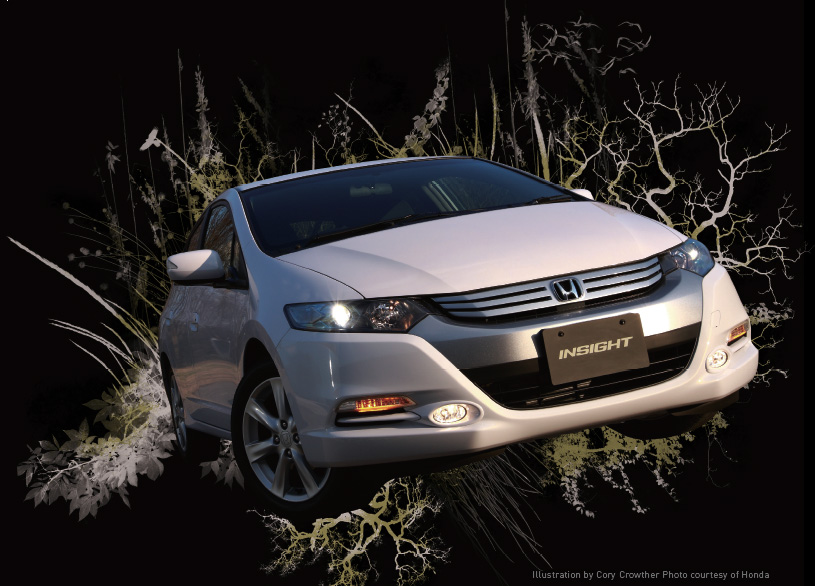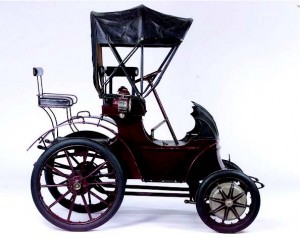By Jay Revelle
It is said that history often repeats itself, but I cannot think of a time when a battle such as this has been waged. The history of the automotive industry has taken many wild turns, but it is now on a road that has yet to be traveled. As the focus on environmentally-friendly and efficient products continues to become the focus of every automaker in Japan and abroad, the competition between Japan’s main three—Toyota, Honda, and Nissan—has intensified and is quickly coming to an apex. In a world where today’s consumers are motivated less by impulse and more by conscience; where vehicle sales brochures speak more about environmental efficiency and less about horsepower; and where herds of new eco-friendly models continue to hit Japan’s roadways and beyond, the dramatic battle to perfect the eco car is a topic of interest almost anyone can enjoy watching unfold—car lover or not.
However, despite this recent attention, eco cars have been around for many years. It was actually Porsche that first invented the concept of the hybrid engine, when in 1901 it began production of the Lohner-Porsche Mixte Hybrid, a horseless carriage powered by hub-mounted electric motors, while also driven by a gasoline engine. The car solved, at the time, what could have been the most pressing form of pollution: horse manure. In the early 1900s, electric cars were actually quite common until the use of gasoline engines became commonplace from the 1920s onward. Fast-forward to the 1970s to a time when fuel prices began to soar, giving birth to the need for more fuel efficient automobiles. This provided a window of opportunity for postwar Japan to showcase its technological advances born from the country’s innate sense for efficiency. It was then that Honda, Toyota, and Nissan began to make their mark slowly but surely, exporting their smaller and more fuel efficient models to the shores of North America. Perhaps with that, the modern concept of the eco car was born, and the race was on.
Honda
Honda Motor Company, Japan’s youngest major automaker, began in 1948 as a very small engine manufacturer, even at one time selling pistons to Toyota. Known initially for its convenient and fuel efficient lines of motorbikes, Honda began producing cars in 1963, and after building its worldwide reputation for efficient, dependable, and funto- drive automobiles, in 1999 it began to mass-produce and market a hybrid model, the first-generation Honda Insight. Initially, the car gained a following and was even seen in the well-known environmental disaster film The Day After Tomorrow, driven by Hollywood actor Dennis Quaid. However, it wasn’t long before it was quickly upstaged by the Toyota Prius—that is, until now. Beginning February 6, 2009, Honda directly targeted the popularity of the Prius and released for sale a fully redesigned Insight, priced lower than the Prius and marketed as the world’s cheapest hybrid production model. The car’s technology greatly improved on the first-generation Insight, and features a lightweight, compact hybrid system that combines enhanced fuel economy with the type of performance and spirit expected from a Honda product. As of the end of March, Honda had received orders for 18,000 units, surpassing current monthly sales of the Toyota Prius and totaling over three and a half times Honda’s projected sales for the Insight’s first month.
However, Honda’s achievements in the eco car segment don’t end there: the immensely popular Civic Hybrid model has been on the market since 2001, and Honda’s concept eco cars are often the talk of the motor shows. Honda’s FCX Clarity, a hydrogenpowered fuel cell concept vehicle, has actually been for sale in southern California since 2008, and further availability is planned for other regions as hydrogen refueling stations become more commonplace. Furthermore, in recognition of Honda’s commitment to leadership in the area of environmental technology and alternative fuels, the Honda FCX Clarity was recently declared the 2009 World Green Car, chosen from an initial entry list of 22 contenders nominated by 59 World Car jurors from 25 countries worldwide.
Nissan
Beginning its days under the name Datsun in 1914, Japan’s thirdbiggest automaker came under new leadership in 2000, undergoing drastic restructuring that brought the company back from the brink of bankruptcy. Today, the company is as highly regarded as ever and is seemingly the only Japanese company to continue designing popular sports car models, such as the GTR and the Fairlady Z. Despite its well-rounded product lineup, Nissan has also stayed competitive in the eco car segment. Although the company is currently without a hybrid model in the Japanese market, it is not without hybrid technology—Nissan sells the popular Altima Hybrid in North America,and has many of its own green projects in the pipeline. For example, Nissan and the city of Yokohama recently announced that they will jointly embark on a project aimed at achieving zero-emission mobility in certain areas of Yokohama, and the company, along with its French partner Renault, will also begin supplying fully electric vehicles to China, which is currently the world’s largest automobile market. The comprehensive plan spans everything from marketing to a battery-charging network, with the goal of releasing electric vehicles in China by early 2011. Furthermore, Nissan has also announced very recently that it has started testing the X-Trail Fuel Cell Vehicle, using a next-generation fuel cell stack. This new fuel cell unit is 25% smaller than the previous design and provides 1.4 times the power output. The development of this technology is part of a broad range of new initiatives that Nissan is pursuing under its Nissan Green Program 2010, a plan focusing on the development of new technologies, products, and services in an attempt to realize real-world reductions in CO2 emissions, cleaner overall emissions, and expanded resource recycling.
Toyota
Toyota began as a manufacturer of automatic looms in 1890, and began producing cars in 1935. The company first introduced the Prius (which means “to go before” in Latin) in 1997, and the second-generation Prius was an instant hit dealers in North America took huge waiting lists and high-profile celebrities stood proudly in front of paparazzi with the silent and futuristic Prius at their side. Demand was so high that even used Prius models sold privately for more than the new sticker price. Thus, the Prius quickly became an icon, winning the hearts of millions around the world, setting the benchmark for the development of eco cars and the technology behind them, and delivering superior fuel economy and ultra-low emissions to more than 1.2 million owners worldwide for more than 10 years so far.
Although very clearly willing to incite a price war with Honda’s Insight, Toyota won’t comment on its official strategy to compete with the new Honda hybrid. However, sources in North America say the new model Prius will get 50 miles per gallon, even though the gasoline half of the hybrid layout was expanded in size from 1.5L to 1.8L. Together with its electric motor, the hybrid system in the new model will generate a combined net horsepower of 134, an improvement of 24 horsepower over the previous generation. The new Prius is scheduled for launch in Japan in mid-May, surprisingly sold alongside its previous model, as part of a highly unorthodox marketing strategy—both cars will be available new from dealerships in an effort to attack the market with a double-edged sword. However, Toyota’s hybrid prowess doesn’t end there: it’s also one of the few companies to have hybrid SUVs on the market, and Toyota has also said recently that a specially designed Lexus luxury sedan hybrid model will debut before the end of the year.
Putting all updated information and analyses aside, can any one company win such a battle? It’s hard to say. Honda’s new Insight is poised to win many over to their camp, while Nissan is never one to be underestimated. Toyota, on the other hand, has had a clear advantage from day one, when they began producing hybrid models to such a high degree at a time when eco cars were still just a small segment of the market. It seems clear however, that there will be two true winners: you and I, the customers; and this crazy rock we call Earth, with its mish-mash of forests, oceans, cities, animals, people, cars, and whatever else, hurtling through space at hundreds of thousands of kilometers per hour. As the prices for eco cars come down and technology goes up, the ability to enjoy a Sunday cruise at the least cost possible to the earth will become more and more a fact of daily life. History may not be repeating itself this time, but it is definitely setting the stage for all future battles in humanity’s quest to save its own habitat, as well as the automobile lifestyle we have come to love so much. When done, it will be a battle won without a loser, for all of us will have won it together.
Eco Car Rundown
• Honda is planning to introduce an all-new hybrid sport-utility vehicle in 2010, which they plan to follow with new hybrid versions of the Civic sedan and the very popular Honda Fit around 2011.
• The Nomura Research Institute says there is a good chance that global sales of hybrid-powered automobiles could top 12 million in 2020, accounting for slightly less than 20 percent of the world’s new passenger cars.
• Porsche was the first company to produce, manufacture, and market a hybrid vehicle in 1901, called the Lohner-Porsche Mixte Hybrid. It was essentially a horseless carriage powered by hub-mounted electric motors, while also driven by a gasoline engine.
• The new Toyota Prius offers a remote air-conditioning system, which is the first system in the world to function on battery power alone, and allows remote operation so the driver can adjust the interior temperature for comfort before getting in the car.
• During the development of the Toyota Prius, more than 1,000 applications for patents were filed worldwide.
• The new Toyota Prius received more hours of wind tunnel testing than any other Toyota in history, thus resulting in one of the cleanest aerodynamic profiles of any mass-produced vehicle in the world.
External Links:
Honda Motor Company
Nissan Company
Toyota Company










